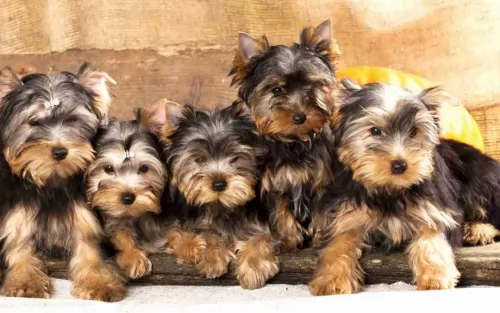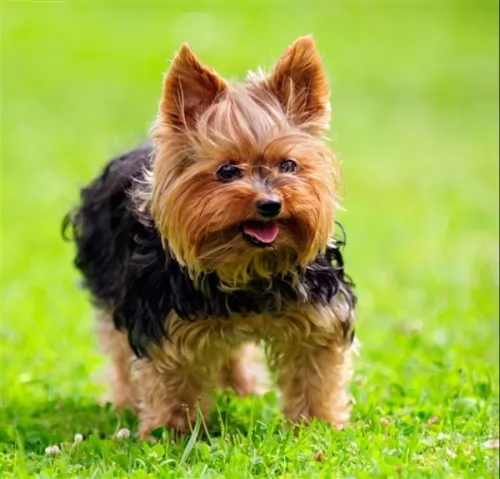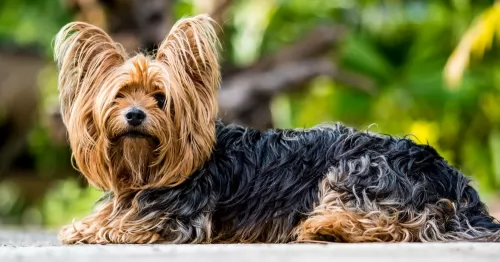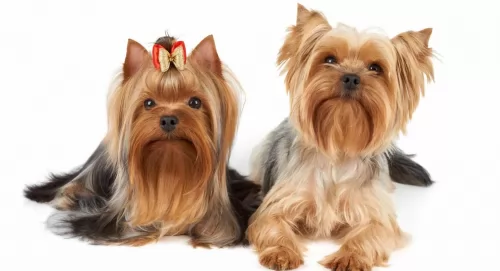 Petzlover
PetzloverYorkshire Terrier is originated from United Kingdom but Dogo Cubano is originated from Cuba. Yorkshire Terrier may grow 32 cm / 12 inches shorter than Dogo Cubano. Yorkshire Terrier may weigh 43 kg / 94 pounds lesser than Dogo Cubano. Yorkshire Terrier may live 5 years more than Dogo Cubano. Yorkshire Terrier may have less litter size than Dogo Cubano. Yorkshire Terrier requires High Maintenance. But Dogo Cubano requires Low Maintenance
 The Yorkshire terrier originated in Yorkshire which is a place in northern England. In mid 19th century workers from Scotland came to Yorkshire in search for work. They brought different varieties of small terriers with them. Earlier they are known as Broken Haired Scotch Terrier and then Toy Terrier. In 1874 they were officially named as Yorkshire Terrier. They begun their journey as hunting dogs and later developed as companion dogs. AKC registered the breed in 1878.
The Yorkshire terrier originated in Yorkshire which is a place in northern England. In mid 19th century workers from Scotland came to Yorkshire in search for work. They brought different varieties of small terriers with them. Earlier they are known as Broken Haired Scotch Terrier and then Toy Terrier. In 1874 they were officially named as Yorkshire Terrier. They begun their journey as hunting dogs and later developed as companion dogs. AKC registered the breed in 1878.
The Cuban Mastiff which came from Cuba, was developed from breeds of Mastiffs, Bulldogs and cattle dogs, with the breed being thought to be extinct since the end of the 19th century.
The Dogo Cubano had a number of roles to fulfill in its day and they were used for guarding stock, for dog fighting and for chasing runaway slaves. After the abolishment of slavery, the large dog had no real role and it died out.
Known also as the Cuban Mastiff or Mastin de Cuba, there isn’t much accuracy as to its origins, with the most common story for their origin being that they are descendants of the Molossus.
The dogs were later introduced into Western Europe, becoming fairly common in England and Spain. The dog was also was also mentioned in the works of canine authors Stonehenge and George Wood.
 Yorkshire terriers are one of the glamorous member of the dog breeds. They have excellent personality as their owner will be surely proud of them when taking them in public. They like to go outside and make adventures. They are good companion dogs and watch dogs too. They are very affectionate with their owners. Yorkies always bark when any stranger comes and they should be taught about neighbours and when to bark. They will get angry on seeing new dogs and surely chases squirrels.
Yorkshire terriers are one of the glamorous member of the dog breeds. They have excellent personality as their owner will be surely proud of them when taking them in public. They like to go outside and make adventures. They are good companion dogs and watch dogs too. They are very affectionate with their owners. Yorkies always bark when any stranger comes and they should be taught about neighbours and when to bark. They will get angry on seeing new dogs and surely chases squirrels.
They like to spend more time with their people. Leaving them alone for long time is not good. Yorkshire terrier should be treated gently and with love. They love to spend time with older children. They love apartment life if they are made to play and walk daily. Yorkies are the second most popular dog in America.
The Dogo Cubano was generally similar to other Mastiffs and stood at rough 48 – 55cm in height and weighing in the region of 45kg.
He was a large dog, powerfully built, muscular and strong. Images of the dog show that it had strong, straight legs with a long tapering tail and medium-sized floppy ears that were sometimes cropped upwards and close to the head.
The dog breed came in a variety of colors such as brown, tan, fawn and brindle. The muzzle was broad and short and black. The dog had pronounced jowls with its face being fairly wrinkly.
This large dog was known for being a courageous, independent and aggressive dog. He became attached to his owner, showing protective characteristics .In those days the dog would have received simple training and certainly if such a large dog still existed today, it would have to receive training and socialization as well.
The Dogo Cubano was an intelligent dog and easily trainable, requiring an owner with a firm hand. Being an aggressive breed, the dog possibly wouldn’t have been the best companion for children. He also wouldn’t have got on too well with pets in the home as he was trained to be a fighter in his day. Independent and strong-willed, the dog would not have suited a novice dog owner.
 Yorkshire terrier are not so much friendly with children. It is not advised to leave them with children without adult supervision.
Yorkshire terrier are not so much friendly with children. It is not advised to leave them with children without adult supervision.
They were previously used to catch rats and hunt badger and fox. They are excellent watchdogs and defend their territory very well.
They adapts well for apartment living. But they will not be happy if leaved alone for a long time. Yorkies cannot tolerate too hot or cold weather.
They are moderately easy to train. Yorkshire terrier should be trained early when they are amenable to process. Sessions should be conducted with lots of treats and must be short as they will easily get bored.
The Dogo Cubano was bred to be a guard dog as well as for dog fighting, but this large dog, with training and socialization, no doubt became a loyal and devoted family pet.
It was actually a social dog, being aggressive towards other dogs. He would be described as a dog better suited to a home with older children.
He was protective with his human family but not very active, being too big to be leaping around like other dog breeds. It is a pity that this large dog has disappeared as he had some good qualities.
The Dogo Cubano was a generally healthy breed, but just like with most other dog breeds, they were also prone to some of the more common dog problems. The chances of him getting sick were slim though.
When the dog first originated, there were unlikely to have been health clearance certificates, but today, you’d want health clearances from the Orthopedic Foundation for Animals.
The reason for this is that hip dysplasia is a heritable condition, seen more often in large dogs, where the thigh bone doesn’t fit into the hip joint properly. The dog suffers with pain and discomfort and the condition can lead to lameness with the dog.
Gastric Torsion or Bloat is a life threatening condition that affects large dogs like the Dogo Cubano and those with deep chests. The stomach is distended with gas and it can twist.
The gas can’t escape and blood flow is hindered. The dog vomits, is lethargic and weak, and immediate veterinary help will be required.
 For English bull dog puppies, When you change the puppy food from liquid to solid initially you must give what the dam is having. This is to avoid digestive problems when new food is introduced. The level of liquid food should be reduced in a step by step manner and thus increasing solid food gradually.
For English bull dog puppies, When you change the puppy food from liquid to solid initially you must give what the dam is having. This is to avoid digestive problems when new food is introduced. The level of liquid food should be reduced in a step by step manner and thus increasing solid food gradually.
You have two choices and one is manufactured dog food and another is home cooked food. Commercial brands are not suggested as they contain artificial coloring and chemical preservatives.
Vaccinations should be made at the right time. The food given should be the best.
Yorkshire terrier should be taught tricks by giving rewards. Exercising them has benefits such as maintaining muscles, release pent-up energy, good for heart, good metabolism, good sleep and be active.
The Dogo Cubano was a large dog, so if he did become used to living in the city, he would have adapted better to life in the country.
He wasn’t a dog requiring too much exercise but he would have needed to go for walks. They were used as guard dogs long ago, and if he had been in existence today, you wouldn’t have been able to include him in your jogging and cycling as he was a dog that could easily overheat.
Not all dogs require the same amount of food. Long ago the Dogo Cubano wouldn’t have had the same variety of dog foods available today. Maybe the dog in those days was fed the same kind of food that his owner ate.
Today, if these dogs were still around, they would require the best quality ‘large dog breed’ kibble.
The better the dog food, the more nourishing it is and the healthier the dog is. The Dog Cubano would likely have been a dog that drooled, leaving quite a bit of backwash in the water bowl, so it would have been important to wash out the drinking bowl and to regularly replace it with cool, fresh water.